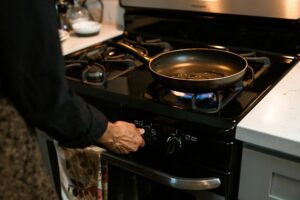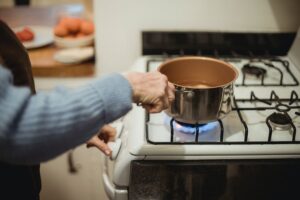Fried Chicken livers are a favorite dish for many but the frying part can pose a little difficulty. For this reason, some people would rather steer clear of doing it.

One particular issue is having chicken livers pop during frying. Even when you’re reheating them in the microwave, they explode and have large globs of fat all over the place.
This can be both messy and potentially dangerous if not managed properly. This is why it’s important to understand how to prevent or minimize this splattering when cooking chicken livers.
Why Do Chicken Livers Pop When Frying?
The simple science behind chicken livers popping during frying is due to the interaction of moisture and heat. When you place chicken livers in a hot pan, the heat quickly evaporates the moisture content in the livers.
This moisture turns into steam and builds pressure within the livers. As the pressure increases, it seeks an escape route. This is often through the surface of the livers.
This rapid release of steam causes the livers to sizzle and release hot droplets of oil that splatter.
How to Keep Chicken Livers From Popping When Frying
Having your chicken livers pop when frying does not point to any significant problem. However, the hot oil droplets from the popping can cause painful burns or scales. Especially if they come into contact with your skin or eyes.
The contact splattering can make your stovetop or kitchen area messy, which can be inconvenient to clean up.
Besides, if oil droplets come in contact with an open flame or a hot element, it can cause a fire hazard. These are some reasons why you might want to prevent or minimize this popping and splattering.
To prevent your chicken livers from popping when frying, here are a few tips to follow.
Pat the Livers Dry Before Frying
Pat the chicken livers dry with paper towels before frying. This would remove excess moisture and reduce the initial build of steam.
By drying your liver, you can prevent the aggressive spattering when it comes into contact with hot oil. After washing, use paper towels or a clean kitchen cloth to gently pat the livers dry.
Make sure you remove as much moisture as possible from the surface. If you’re seasoning the livers, you can also lightly coat them with flour or a seasoned breading mixture.
This flour will provide a barrier between the liver and the oil, keeping moisture problems at bay.
Use a Splatter Guard
Getting a splatter guard is a very obvious option when you do a lot of frying. You can place a splatter guard or lid partially over the frying pan.
This would contain the splattering and you would also protect yourself from hot oil droplets.
Make Incisions on the Livers
This is a common solution many people recommend. Piercing the skin of the liver and making incisions will allow any steam to escape gradually.
This would reduce any violent popping and splattering. You can use a sharp knife to make small and shallow cuts on the surface of each liver.
The cuts should be about 1/4 to 1/2 inch deep and look like small slits or crisscross patterns. Otherwise, you can use a fork to simply pierce the surfaces on both sides.
Use a Good Pan at the Right Temperature

Use a heavy-duty frying pan or skillet and preheat it over medium-high heat. A heavy pan distributes heat more evenly which reduces splattering.
Invest in a good-quality pan. A heavy-bottomed pan, like a cast-iron skillet, is less likely to heat unevenly and cause popping.
Also, make sure the pan is heated properly before adding the chicken livers. You can test it by sprinkling a few drops of water in the pan. If they sizzle and evaporate quickly, it’s ready.
Use a Deep-Fryer
If you own a deep fryer, you could use this to fry the chicken livers instead. Deep fryers typically have a basket which is a containment structure that holds the food being fried.
The walls of the fryer prevent oil and food particles from splattering outside of the fryer. Moreover, deep fryers are designed to maintain a consistent and controlled temperature.
This reduces the likelihood of splatters bursts of steam or oil.
Avoid Overcrowding the Pan
Do not overcrowd the pan by frying too many livers at once. When you overcrowd the pan with the livers, the moisture and juices can create steam. When trapped in a crowded pan, the steam has nowhere to escape.
This steam buildup can lead to more violent popping. Instead, give them enough space to cook without touching each other. You could fry the chicken livers in batches if possible, leaving some space between them.
By frying in smaller batches, you allow the heat to circulate better and the moisture can escape.
Flip Gently While Frying
When it’s time to flip the chicken livers, do so gently and with caution. This would go a long way in preventing splattering. Use utensils like tongs or a spatula which are designed for flipping delicate items.
Plus, avoid flipping every minute, as this can release more steam and cause more splatter. Always flip with a smooth and controlled motion.
Avoid turning or pressing down on the livers forcefully. This can squeeze out juices and lead to more popping.
Marinate or Season
Consider marinating the chicken livers in your choice of seasonings or sauces before frying. Don’t be scared to get creative with seasoning your livers.
Marinating not only adds flavor but also reduces splattering. You can infuse the chicken livers with your choice of seasonings, herbs, spices, and sauces.
Monitor the Heat

Maintaining the right cooking temperature is important when frying. If the heat is too low, the livers may not cook properly, and if it’s too high, they can pop aggressively.
This is why you need to keep an eye on the heat at all times and adjust it if necessary. You can make quick adjustments to ensure that the livers cook well and the oil does not splash all over.
To monitor the heat, you can use a kitchen thermometer to check the oil’s temperature regularly. Adjust the burner to keep the oil at the desired frying temperature, typically around 350-375°F (175-190°C)
Reducing the frying temperature a little will reduce the popping. However, you’ll need to fry at a temperature that’s above the boiling point for your livers to come out crispy.
For Next Time You’re Frying,
Wear Safety Gear
You could wear appropriate protective gear to shield yourself from hot oil and splattering. Some appropriate safety gear includes long cooking gloves, long-sleeved clothing, safety goggles, and an apron.
The goggles are particularly important to protect your eyes from hot oil splashes. This is a practical way of taking precautions to protect yourself from potentially splattering hot oil on yourself.
Wearing safety gear can ensure a safer cooking experience.
Remember that by following these tips, you can minimize splattering when you’re frying or microwaving chicken liver. Although despite these precautions, you might still have to deal with some level of popping.
However, following these tips will help reduce it significantly. Then you can enjoy perfectly fried chicken livers without the associated safety hazards.
